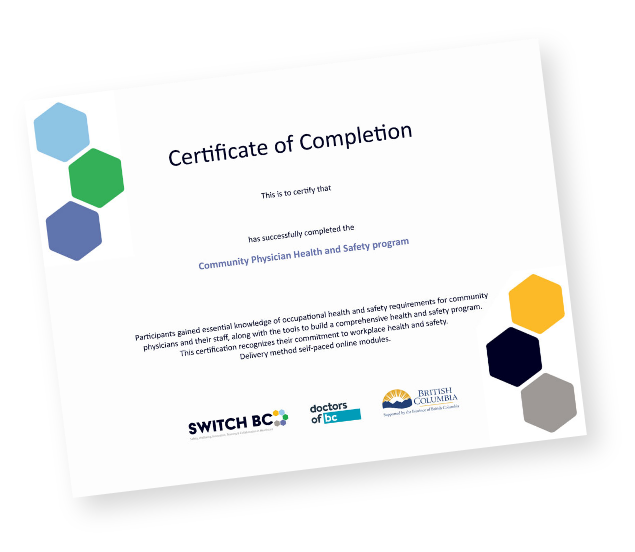Health and Safety Program
All workplaces, including medical clinics, are required to have an occupational health and safety program to prevent work-related injuries, illnesses, and diseases. An occupational health and safety program helps physician-employers protect their staff, minimize risks, and maintain a healthy and safe clinic environment.

Program Requirements
-
Review Requirements
Every workplace — even small businesses — must have a health and safety program to help prevent work-related injuries and illnesses.
An occupational health and safety program helps employers keep workplaces safe by managing risks, sharing clear safety rules with staff, and setting goals to improve safety. It also assigns roles and responsibilities to ensure tasks are done right, reducing injuries and costs from missed work or disabilities.
The first step in starting an occupational health and safety program is to assess the total number of workers in the clinic, including all clinical and administrative staff, to determine the appropriate type of program required. Everyone who is regularly employed in the clinic should be included. WorkSafeBC classifies all community physician and specialist clinics as low-risk workplaces for occupational injuries. Therefore:
- If your clinic has < 50 workers, a less formal health and safety program is required. This program focuses on regular monthly meetings with staff to discuss health and safety matters.
- If your clinic has ≥ 50 workers, a formal health and safety program is required. This program must also include management meetings to review safety activities, incidents, and statistics.
Regardless of type, all health and safety programs should include the following elements:
- Regular meetings to discuss health and safety
- Regular workplace inspections
- Written safe work practices or procedures for workers
- Worker training, orientation, and supervision
- Incident reporting and investigation
- First aid provisions
The health and safety program should also include elements for specific workplace risks. For example, medical clinics must have a violence prevention program, as workplace violence is a common hazard.
All of these program elements will be covered in the upcoming sections.
Program Policy
-
Complete Health and Safety Policy
An occupational health and safety program should have a written health and safety policy that outlines the program’s purpose and health and safety responsibilities. This policy is required for workplaces with 50 or more workers and recommended as best practice for smaller workplaces.
The policy should be dated, signed by the employer, and reviewed annually. Be sure to share it with staff. It’s a good idea to post it in a visible location at the workplace where all staff can easily see it.
Policy and Procedures Review Frequency
-
Policy and Procedures Review Frequency
As you navigate the web portal, you’ll find various health and safety policies and procedures that may apply to your clinic’s operations. Some must be reviewed annually, as per WorkSafeBC regulations, while others are reviewed as needed. Management should lead the review, with input from the worker representative or Joint Occupational Health & Safety Committee (if the clinic requires one). Ensure the approval date is updated on the document after completing the review.
As per WorkSafeBC regulations, the following policies and procedures, if applicable to your clinic, must be reviewed annually:
Policy and Procedures Review Frequency Bullying and Harassment Policy and Procedure Annually Emergency Drill (form) Annually Exposure Control Plan for Biological Hazards Annually Exposure Control Plan for Ionizing Radiation Annually First Aid Assessment (form) Annually First Aid Drill Annually JOHSC Terms of Reference Annually JOHSC Annual Evaluation Annually Occupational Health and Safety Policy Annually PPE Policy and Safe Work Practices Annually Working Alone and In Isolation Policy and Procedure Annually The following policies and procedures, if applicable to your clinic, should be reviewed as needed, or when there’s a significant change to clinic operations, such as a move or renovation, or after a near miss or incident:
Policy and Procedures Review Frequency Emergency Preparedness Plan and Response Procedures As needed Liquid Nitrogen Safe Work Practices As needed Patient Code of Conduct As needed Violence Prevention Policy and Procedure As needed


